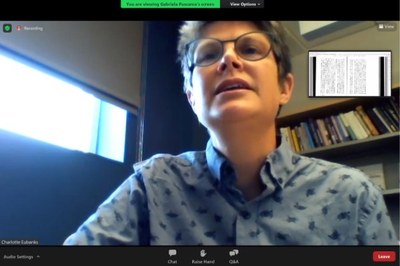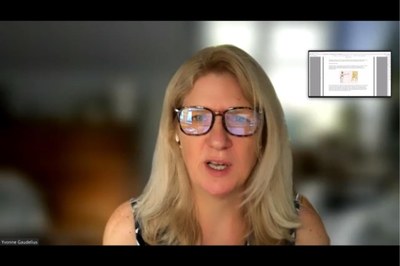Penn Staters “Escape It All” at the 2021 Marathon Read


- Co-organizers Gabriela Puscama (above) and Nancy Andrus (below) introduce the 2021 Marathon Read
 From 10AM-10PM, participants took turns reading from a selection of texts from around the world that are inspired, albeit in distinct ways, by the “escape from reality into alternative realities” theme. They included Japanese author Tawada Yoko's short story collection March Was Made of Yarn; Humus by French novelist Fabienne Kanor; the much beloved novella Le Petit Prince by Antoine de Saint-Exupéry; Wolfgang Herrndorf’s bestselling novel Tschick; La invención de Morel [The Invention of Morel] by Argentine writer Adolfo Bioy Casares; Italian author Italo Calvino’s story collection Marcovaldo; and 北京折叠 [Folding Beijing] by Chinese science fiction writer Hao Jingfang.
From 10AM-10PM, participants took turns reading from a selection of texts from around the world that are inspired, albeit in distinct ways, by the “escape from reality into alternative realities” theme. They included Japanese author Tawada Yoko's short story collection March Was Made of Yarn; Humus by French novelist Fabienne Kanor; the much beloved novella Le Petit Prince by Antoine de Saint-Exupéry; Wolfgang Herrndorf’s bestselling novel Tschick; La invención de Morel [The Invention of Morel] by Argentine writer Adolfo Bioy Casares; Italian author Italo Calvino’s story collection Marcovaldo; and 北京折叠 [Folding Beijing] by Chinese science fiction writer Hao Jingfang.

- Charlotte Eubanks reads a story by Tawada Yoko, in Japanese

- Yvonne Gaudelius reads from “Le Petit Prince”
Others were able to read at the event for the first time, including Elizabeth King, a 1979 graduate of the College of the Liberal Arts. King is no stranger to giving back to Penn State: she started an undergraduate scholarship for students in the School of Hospitality Management in 2011, and currently serves as a mentor to students in that program. Participating in the Marathon Read, where she read from Stitching A Whirlwind: An Anthology of Southern African Poems and Translations, was a new way for King to contribute to the Penn State community, an experience that was both exciting and challenging. “It was exciting but also challenging to read because the names in the poems were South African, and I had to do a lot of preparation to try to do some justice to the beautiful names and the poems themselves,” King said.
Like Bueter, Eubanks, and Gaudelius, King appreciated how the event allowed for speakers to read from various languages, which she suggested increased the complexity of the readings. “Not only were the readers very interesting and diverse, but some read in both the native language and English,” King noted. Puscama echoed King’s sentiments, saying, “we were delighted listening to literature in languages like Arabic, Zulu, Mandarin, Japanese and many, many others.”

- Richard Page reads in German from “Tschick”
Eubanks echoed Puscama’s sentiments about the array of feelings evoked by this unique public reading event. “If you were lucky enough to have people who read to you when you were a kid, you'll remember that feeling of being enveloped by a story and a voice,” Eubanks said. “The Marathon Read is a great chance to reactivate that feeling.”


- Co-organizers Gabriela Puscama (above) and Nancy Andrus (below) introduce the 2021 Marathon Read
 From 10AM-10PM, participants took turns reading from a selection of texts from around the world that are inspired, albeit in distinct ways, by the “escape from reality into alternative realities” theme. They included Japanese author Tawada Yoko's short story collection March Was Made of Yarn; Humus by French novelist Fabienne Kanor; the much beloved novella Le Petit Prince by Antoine de Saint-Exupéry; Wolfgang Herrndorf’s bestselling novel Tschick; La invención de Morel [The Invention of Morel] by Argentine writer Adolfo Bioy Casares; Italian author Italo Calvino’s story collection Marcovaldo; and 北京折叠 [Folding Beijing] by Chinese science fiction writer Hao Jingfang.
From 10AM-10PM, participants took turns reading from a selection of texts from around the world that are inspired, albeit in distinct ways, by the “escape from reality into alternative realities” theme. They included Japanese author Tawada Yoko's short story collection March Was Made of Yarn; Humus by French novelist Fabienne Kanor; the much beloved novella Le Petit Prince by Antoine de Saint-Exupéry; Wolfgang Herrndorf’s bestselling novel Tschick; La invención de Morel [The Invention of Morel] by Argentine writer Adolfo Bioy Casares; Italian author Italo Calvino’s story collection Marcovaldo; and 北京折叠 [Folding Beijing] by Chinese science fiction writer Hao Jingfang.

- Charlotte Eubanks reads a story by Tawada Yoko, in Japanese

- Yvonne Gaudelius reads from “Le Petit Prince”
Others were able to read at the event for the first time, including Elizabeth King, a 1979 graduate of the College of the Liberal Arts. King is no stranger to giving back to Penn State: she started an undergraduate scholarship for students in the School of Hospitality Management in 2011, and currently serves as a mentor to students in that program. Participating in the Marathon Read, where she read from Stitching A Whirlwind: An Anthology of Southern African Poems and Translations, was a new way for King to contribute to the Penn State community, an experience that was both exciting and challenging. “It was exciting but also challenging to read because the names in the poems were South African, and I had to do a lot of preparation to try to do some justice to the beautiful names and the poems themselves,” King said.
Like Bueter, Eubanks, and Gaudelius, King appreciated how the event allowed for speakers to read from various languages, which she suggested increased the complexity of the readings. “Not only were the readers very interesting and diverse, but some read in both the native language and English,” King noted. Puscama echoed King’s sentiments, saying, “we were delighted listening to literature in languages like Arabic, Zulu, Mandarin, Japanese and many, many others.”

- Richard Page reads in German from “Tschick”
Eubanks echoed Puscama’s sentiments about the array of feelings evoked by this unique public reading event. “If you were lucky enough to have people who read to you when you were a kid, you'll remember that feeling of being enveloped by a story and a voice,” Eubanks said. “The Marathon Read is a great chance to reactivate that feeling.”